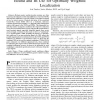Free Online Productivity Tools
i2Speak
i2Symbol
i2OCR
iTex2Img
iWeb2Print
iWeb2Shot
i2Type
iPdf2Split
iPdf2Merge
i2Bopomofo
i2Arabic
i2Style
i2Image
i2PDF
iLatex2Rtf
Sci2ools
TSP
2011
2011
Joint TDOA and FDOA Estimation: A Conditional Bound and Its Use for Optimally Weighted Localization
—Modern passive emitter-location systems are often based on joint estimation of the time-difference of arrival (TDOA) and frequency-difference of arrival (FDOA) of an unknown signal at two (or more) sensors. Classical derivation of the associated Cramér-Rao bound (CRB) relies on a stochastic, stationary Gaussian signal-model, leading to a diagonal Fisher information matrix with respect to the TDOA and FDOA. This diagonality implies that (under asymptotic conditions) the respective estimation errors are uncorrelated. However, for some specific (nonstationary, non-Gaussian) signals, especially chirp-like signals, these errors can be strongly correlated. In this work we derive a “conditional” (or a “signal-specific”) CRB, modeling the signal as a deterministic unknown. Given any particular signal, our CRB reflects the possible signal-induced correlation between the TDOA and FDOA estimates. In addition to its theoretical value, we show that the resulting CRB can be used for o...
Respective Estimation Errors | Stationary Gaussian Signal-model | TSP 2011 | —Modern Passive Emitter-location |
| Added | 15 May 2011 |
| Updated | 15 May 2011 |
| Type | Journal |
| Year | 2011 |
| Where | TSP |
| Authors | Arie Yeredor, Eyal Angel |
Comments (0)

